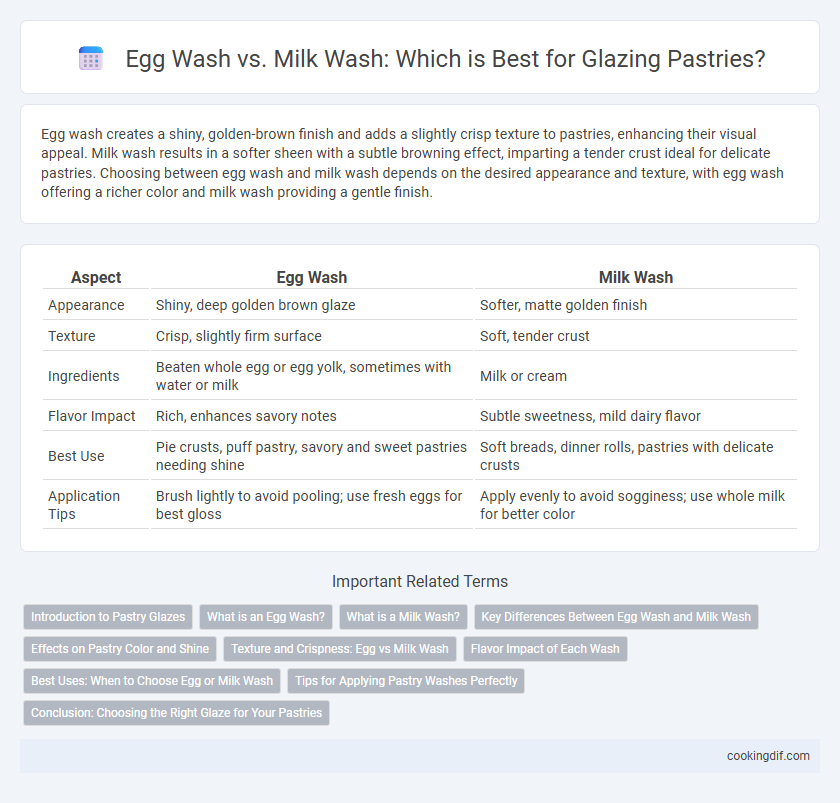Egg wash creates a shiny, golden-brown finish and adds a slightly crisp texture to pastries, enhancing their visual appeal. Milk wash results in a softer sheen with a subtle browning effect, imparting a tender crust ideal for delicate pastries. Choosing between egg wash and milk wash depends on the desired appearance and texture, with egg wash offering a richer color and milk wash providing a gentle finish.
Table of Comparison
| Aspect | Egg Wash | Milk Wash |
|---|---|---|
| Appearance | Shiny, deep golden brown glaze | Softer, matte golden finish |
| Texture | Crisp, slightly firm surface | Soft, tender crust |
| Ingredients | Beaten whole egg or egg yolk, sometimes with water or milk | Milk or cream |
| Flavor Impact | Rich, enhances savory notes | Subtle sweetness, mild dairy flavor |
| Best Use | Pie crusts, puff pastry, savory and sweet pastries needing shine | Soft breads, dinner rolls, pastries with delicate crusts |
| Application Tips | Brush lightly to avoid pooling; use fresh eggs for best gloss | Apply evenly to avoid sogginess; use whole milk for better color |
Introduction to Pastry Glazes
Egg wash, composed of beaten eggs often mixed with water or milk, creates a glossy, golden-brown finish on pastries due to its protein content that enhances browning through the Maillard reaction. Milk wash provides a softer sheen and more subtle browning because its sugars contribute to caramelization without the intense color or shine of egg wash. Choosing between egg wash and milk wash depends on the desired texture, appearance, and flavor profile of the baked goods.
What is an Egg Wash?
An egg wash, a mixture of beaten eggs sometimes combined with water or milk, is applied to pastries before baking to create a glossy, golden-brown finish. Rich in protein and fat, egg wash enhances browning through the Maillard reaction and helps toppings like seeds adhere to the dough. Unlike milk wash, egg wash provides a more vibrant shine and a slightly crisp texture to the pastry crust.
What is a Milk Wash?
A milk wash is a coating made from milk applied to pastry surfaces before baking to create a soft, golden sheen and enhance browning through lactose caramelization. Unlike egg wash, which provides a glossy and firm crust, milk wash results in a subtler, matte finish with a tender texture. Its mild sugars and proteins contribute to delicate crust coloration without overpowering the pastry's flavor or appearance.
Key Differences Between Egg Wash and Milk Wash
Egg wash, composed primarily of beaten eggs, imparts a rich, golden-brown color and a glossy finish to pastries, enhancing both appearance and texture. Milk wash, on the other hand, offers a softer sheen with a lighter color and contributes subtle moisture for a tender crust without the intense shine. The protein content in egg wash promotes browning through Maillard reactions, whereas milk wash's lactose content results in gentle caramelization, making the choice dependent on the desired visual and textural outcome.
Effects on Pastry Color and Shine
Egg wash creates a glossy, deep golden-brown finish on pastries due to its protein and fat content, enhancing both color intensity and shine. Milk wash produces a softer, matte or lightly browned surface with subtle shine, offering a gentler color and less gloss compared to egg wash. The choice between egg and milk wash influences the visual appeal of baked goods, with egg wash delivering a more vibrant and polished look.
Texture and Crispness: Egg vs Milk Wash
Egg wash creates a glossy, golden-brown crust with a crisp texture on pastries, enhancing their visual appeal and adding a slight crunch. Milk wash produces a softer, matte finish with a tender crust, contributing to a more delicate bite. The high protein content in egg wash promotes browning and crispiness, while the lactose and fats in milk wash result in a gentler, less crisp surface.
Flavor Impact of Each Wash
Egg wash creates a rich, golden-brown glaze with a slightly savory, umami flavor that enhances the pastry's taste and texture. Milk wash offers a softer, matte finish with a subtle sweetness, lending a delicate flavor that complements lighter pastries like scones or muffins. Choosing between egg wash and milk wash significantly impacts the overall flavor profile, with egg wash providing more depth and milk wash imparting gentle sweetness.
Best Uses: When to Choose Egg or Milk Wash
Egg wash provides a rich, glossy finish ideal for savory pastries like pies and croissants, while milk wash offers a softer, matte sheen suited for tender baked goods such as biscuits and scones. Egg wash enhances browning and creates a firm crust, making it perfect for puff pastry and empanadas needing a golden appearance. Milk wash is preferable for pastries requiring a gentle color and slight crispness without overpowering the delicate texture.
Tips for Applying Pastry Washes Perfectly
Applying egg wash ensures a glossy, deep golden finish while milk wash produces a softer, matte glaze with gentle browning. For flawless results, apply washes evenly using a soft pastry brush and avoid overloading to prevent soggy dough. Brush just before baking to maintain the desired shine and texture, and adjust wash type based on pastry type for optimal appearance.
Conclusion: Choosing the Right Glaze for Your Pastries
Egg wash provides a glossy, golden-brown finish with a rich color and firm texture, making it ideal for savory pastries and those requiring a pronounced shine. Milk wash offers a softer, matte sheen with a slightly tender crust, preferred for sweeter pastries or delicate baked goods. Selecting the right glaze depends on the desired appearance and texture, balancing visual appeal with flavor profiles to enhance the final pastry presentation.
Egg wash vs Milk wash for glazing pastries Infographic

 cookingdif.com
cookingdif.com